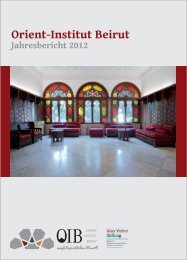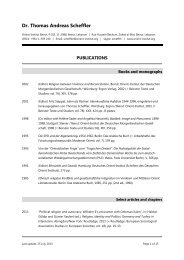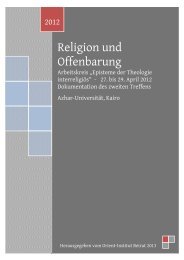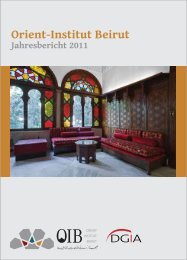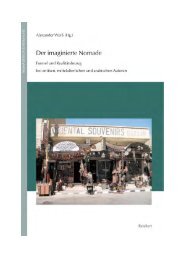Orient-Institut Beirut
Orient-Institut Beirut
Orient-Institut Beirut
Sie wollen auch ein ePaper? Erhöhen Sie die Reichweite Ihrer Titel.
YUMPU macht aus Druck-PDFs automatisch weboptimierte ePaper, die Google liebt.
elevant ministries and organisations. The third and last section analyses NGOs’ work in<br />
agriculture in detail. This section will draw on data gathered in qualitative interviews with<br />
NGO staff 2 . Using government and UN data I have drawn up a comprehensive list of NGOs<br />
working in this field and am in the process of interviewing managers and staff of these<br />
NGOs.<br />
Data Gathered so Far:<br />
The critical review of the NGO sector was based on archival research at CTRDA, the Centre<br />
for Training and Research in Development Action, an Oxfam funded NGO, running a library<br />
including many, I would hazard all, reports written on NGOs in Lebanon. CTRDA also runs<br />
an NGO newspaper archive, photocopying and archiving newspaper articles dealing with<br />
NGOs in Lebanon. Another archive I used for NGO specific sources, were selected UN<br />
publications found at the UNESCWA library. I also visited the offices of Lebanon Support,<br />
which is an organisation running an online platform were NGOs can advertise their profile,<br />
job vacancies, publicise tenders and project reports. The managers of the website<br />
complement the data offered by NGOs with ‘needs assessments’ based on their own surveys<br />
(as for instance after the July War in 2006 or the siege on Nahr el Bared in 2008) and by<br />
publicising government or UN reports on poverty and economic depravation. From these<br />
sources I have gained access to the following data sets: NGO survey carried out by MoSA in<br />
2004, MoSA household survey on living conditions in 1998 and 2004, survey of poverty<br />
clusters commissioned by the Economics and Social Fund for Development (EU funded),<br />
land ownership registers of farmers subscribing to irrigation projects managed by the<br />
Litani water authority and voter registrations (a controversial proxy for sectarian<br />
distribution).<br />
I carried out several field visits and around 70 interviews with agro-engineers, government<br />
employees, NGO experts in government institutions, research centres and at university. In<br />
addition I interviewed NGO employees, usually from the middle management level. In<br />
addition I carried out a small pilot survey in two Lebanese villages (Sara’een and ‘Arsal see<br />
footnote 2).<br />
I presented my work at three conferences: in Amman (Feb.), London (Sept.) and<br />
Philadelphia (Nov.).<br />
Jonas Teichgreeber (Stipendiat, Mai bis November 2008)<br />
Meine Dissertation untersucht die Auswirkungen des Regimewechsels im Irak auf das<br />
Haschemitische Königreich Jordanien. Durch den Irakkrieg verlor Jordanien seinen<br />
wichtigsten Handelspartner und wurde zum Zufluchtsort Tausender irakischer Flüchtlinge.<br />
2 At this point I would like to make a small side note on methodology. When I first set out on my fieldwork a year ago it was my intention to interview<br />
beneficiaries of NGO agricultural services in Lebanese villages. I identified two distinct regions and altogether four villages to carry out pilot interviews with<br />
beneficiaries, intending to ask them about who provides them with services and how satisfied they were with them. I knew about NGO activity in both<br />
regions and came to both regions with a local contact, who had family connections in these villages. To my, I now feel naïve, surprise most farmers I spoke<br />
to, said they did not receive any support or services at all, from anybody. When I mentioned the NGO projects I knew about, they insisted that they did not<br />
benefit from them. When I asked whether they could name someone they knew had benefited from such projects I always received the answer that they did<br />
not know anyone. Now, while the clam not to be a beneficiary might be truthful, it is very unlikely that nobody knew anybody benefiting from NGO work. I<br />
spoke about my experience with several agricultural engineers, all of whom pointed out to me that Lebanon is awash with NGOs and that as a ‘western’<br />
foreigner asking about NGOs, most farmers would have suspected that I was somehow linked to the sector by more than just scholarly interest; and that they<br />
did not want to ruin their chances for possible future benefits by telling me they were already benefitting from other NGO programmes. I consequently<br />
abandoned interviewing beneficiaries directly but concentrated on interviewing NGO staff. This inability to assess effectiveness will shift the weight of my<br />
research towards discourse analysis of NGOs.<br />
43



